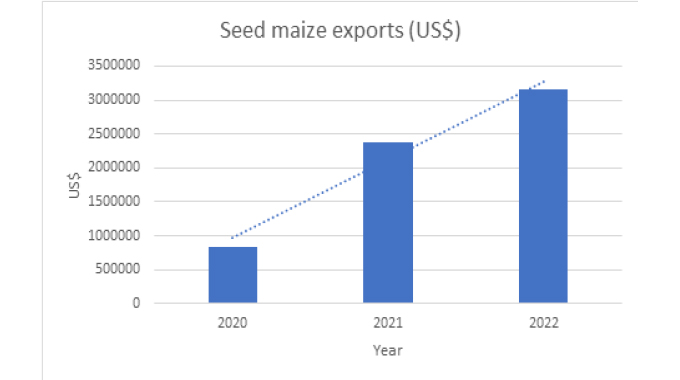Hybrid traditional grains to boost production

Edgar Vhera
Agriculture Specialist Writer
THE Government’s declaration of traditional grains as strategic crops has received a boost with a local seed company releasing high-yielding hybrid millet, sorghum and sunflower varieties for the 2023/24 cropping season to boost productivity and production.
Seed Co global head of research and development Mr Gorden Mabuyaye said this during a telephone interview yesterday.
“We are releasing high-yielding traditional grain and sunflower varieties starting this coming summer season. Red sorghum varieties are currently available on the market while its white counterpart will be available next year,” said Mr Mabuyaye.
Mr Mabuyaye revealed that red and white sorghum varieties had potential yields of 8, 5 and 7,5 tonnes per hectare respectively.
He also disclosed that a maximum of 3, 3 tonnes per hectare was possible from pearl millet with sunflower at 3, 7.
“To increase hybrid seed availability on the market, we are bulking up the parent stock. We will then bulk up breeder stock to increase hybrid seed production,” added Mr Mabuyaye.
Zimbabwe Farmers Union secretary general Mr Paul Zakariya said the development of hybrid seed fell in line with the Government’s import substitution drive, as foreign currency would be saved from enhanced local production.
“By producing our own hybrid traditional grains we don’t expend money on importing them from other countries. It also gives the nation seed sovereignty, for one who owns the seed controls you.
“We call upon the company and other players to increase production of the seeds to cater for the whole country’s requirements, as well as export surplus to earn foreign currency,” said Mr Zakariya.
Lands, Agriculture, Fisheries, Water and Rural Development permanent secretary Dr John Basera said the foundation of the development of a vibrant agricultural sector was the seed sub-sector.
“Without the provision of quality seeds, there would be no success stories in the cropping sub-sector to talk about.
“It is in this regard that Government applauds investments that Seed Co undertook to ensure that farmers are supplied with high-yielding seeds that are disease and drought tolerant and match soil and climatic conditions in the country’s dry agro-ecological regions,” said Dr Basera.
Dr Basera said climate proofing agricultural production had resulted in increased area planted under traditional grains (sorghum, pearl and finger millet, groundnut, sunflower, bambara and African pea) by 27 percent from 1 008 758 hectares in 2021 to 1 282 379ha in 2022.
For the 2022/23 agriculture production season the Government under the Pfumvudza/Intwasa programme distributed seeds according to agro-ecological potential to increase production.
Traditional grain production was given prominence in Matabeleland provinces, Masvingo, Midlands and parts of Manicaland and Mashonaland provinces.
Over the period 1980 to 2022 the country has been recording very low yields of sorghum and sunflower at an average of 0, 39 and 0, 40 tonnes per hectare respectively. One of the main causes for this low productivity was the cultivation of low yielding open-pollinated varieties from farmer’s stored seed that had been losing their vigour over the years.
Meanwhile, Seed Co and other companies continue to supply the country with adequate improved high yielding hybrid maize seeds and exporting the surplus to generate foreign currency for the country.










Comments